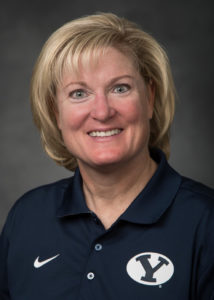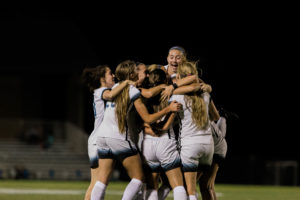The high air quality index in Provo two weeks ago kept the BYU women’s soccer team on alert, forcing them to practice inside one day and to find backup locations for games.

Carolyn Billings, director of sports medicine and BYU women’s soccer athletic trainer, said the NCAA has specific guidelines for when physical activity can occur outside in relation to the air quality index.
In the NCAA guidelines, levels of 150 to 200 or higher are said to be unhealthy for outdoor activities, and at a level of 100, very sensitive athletes with health conditions, like asthma or lung or heart issues, should be removed. Billings said she considered these guidelines and the government’s guidelines for the military to decide what BYU athletics should do.
“(One hundred and fifty) is the lower end, but I think it’s safe, and it gives you a little leeway,” Billings said. “The public image is what I was worried about, so that’s why I brought in the government guidelines and looked at what they use for their military, and they use 150.”
Billings was worried about alerting the public by conflicting with KSL, who uses the AirNow index. The index states 150 is on the higher end of unhealthy air quality index levels, which clashes with the NCAA’s index. The NCAA index has 150 on the lower end of unhealthy levels. Billings set 150 to be the point where BYU athletic practices are moved indoors or games are relocated to avoid public concern.
The women’s soccer team had to move one of their practices into the Indoor Practice Facility and Billings had to watch the indexes every hour leading up to practices and especially games. She said the game against Long Beach State on Sept. 17 was when they had to put the plan in place. She and BYU administration acquired the options to play at Rio Tinto or the University of Utah.
“I wanted to have a game plan in place. Thankfully, we were able to watch everything and it worked just as we’d planned,” she said. “We knew the south winds would kick up, and so at 5:30 p.m., it was actually one of the most beautiful nights, and we got to play the game.”
The Cougars were also uncertain if they would get to play UVU at home on Sept. 21. However, Billings explained that the smoke eventually cleared out in time for the 7 p.m. game, but that she again had to constantly monitor the levels throughout the day and had secured the option to play at the University of Utah if needed.

Rachel Bingham Lyman, a midfielder for the BYU women’s soccer team, said she and her teammates tried to not let the uncertainty about where they would play affect them.
“I think our team did a really good job of just being ready for whatever they told us to do,” Lyman said. “That’s what’s so special about this team: we’re ready for anything that comes our way.”
Lyman’s family lives up Covered Bridge Canyon in Spanish Fork where the fire is a quarter of a mile from their home. She said they found out they needed to evacuate their home the weekend women’s soccer played Marquette University.
“My parents were actually in Wisconsin with us, so they didn’t go grab anything,” Lyman said. “People just went up to our house and grabbed the stuff we told them to.”

Lyman said the experience was eye-opening because she never thought her childhood home could potentially burn down, making her anxious about the possibility of not being able to show her future children where she grew up. She said her team has been helpful during this trial.
“When I found out about it, I was pretty upset, but we said a team prayer right there and everyone was nice and supportive about it and helped me through it,” Lyman said.

Brent Anderson, BYU’s assistant soccer coach for the women’s team, said their initial reaction to the fires wasn’t a concern about how it would affect the team with practices and games.
“We were concerned from the start with the fire, but as we were back in Milwaukee and (Lyman) started getting word from her family where the fire was and that it was close to her home, we had a lot of concern,” Anderson said. “A lot of BYU staff members live in those areas and other people we’re close to, so it was concerning for us that we had friends and family in harm’s way.”
Lyman said she is thankful for the firefighters fighting these fires and that they are in her prayers. She and her teammates kicked off conference play against Gonzaga on Sept. 27 with a 3-1 win and a 3-0 win against Portland on Sept. 29.




